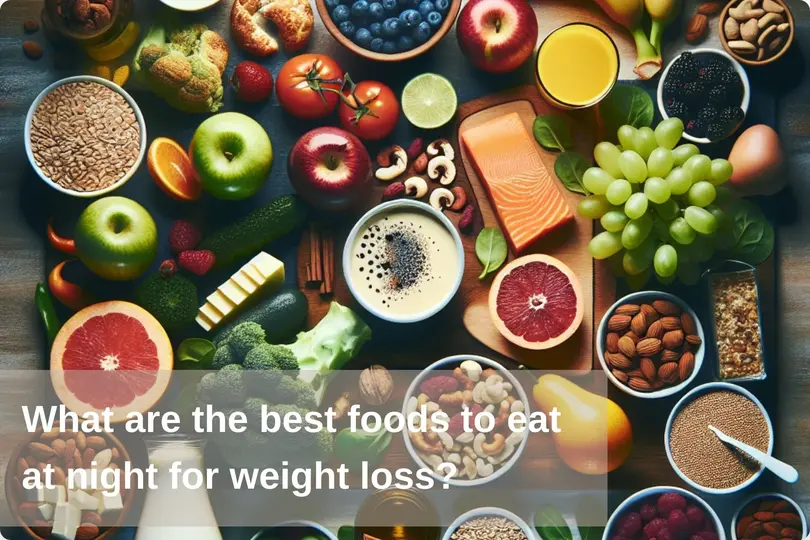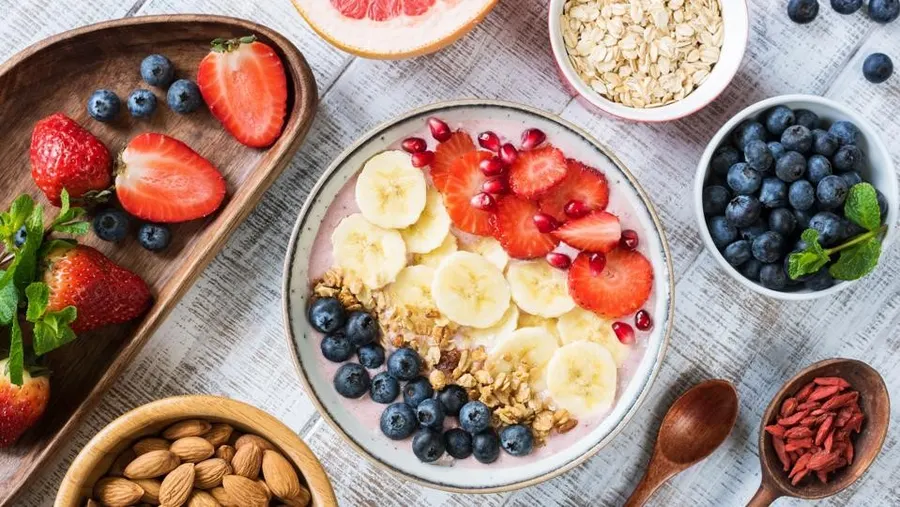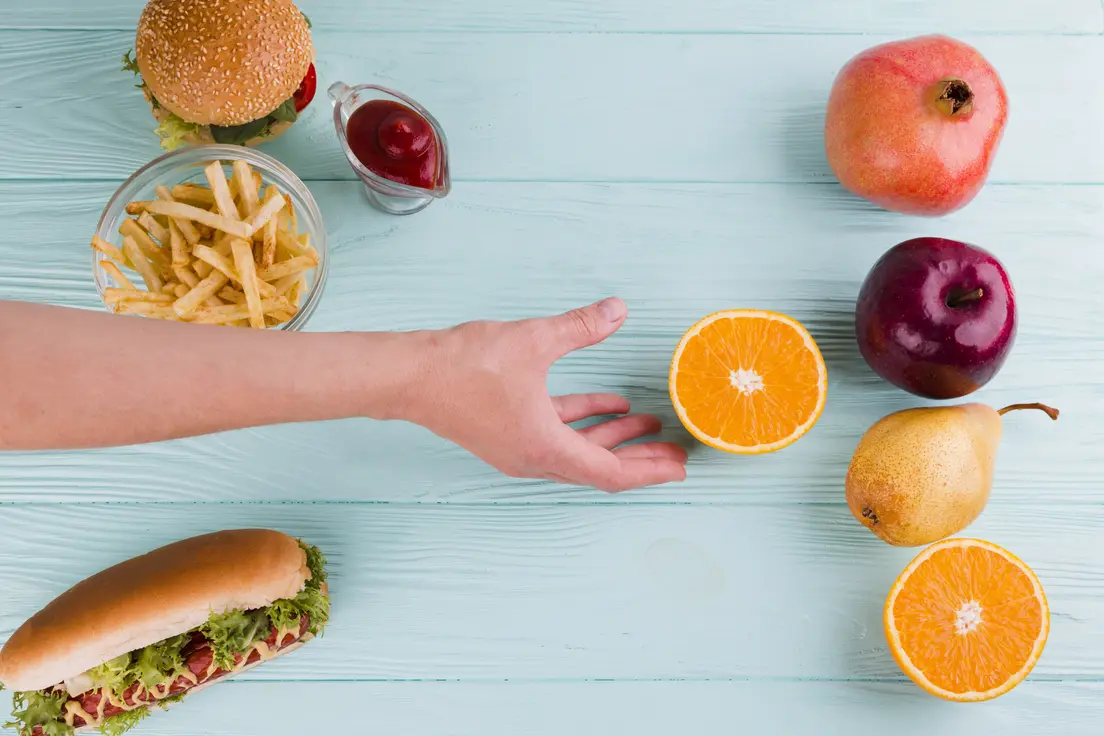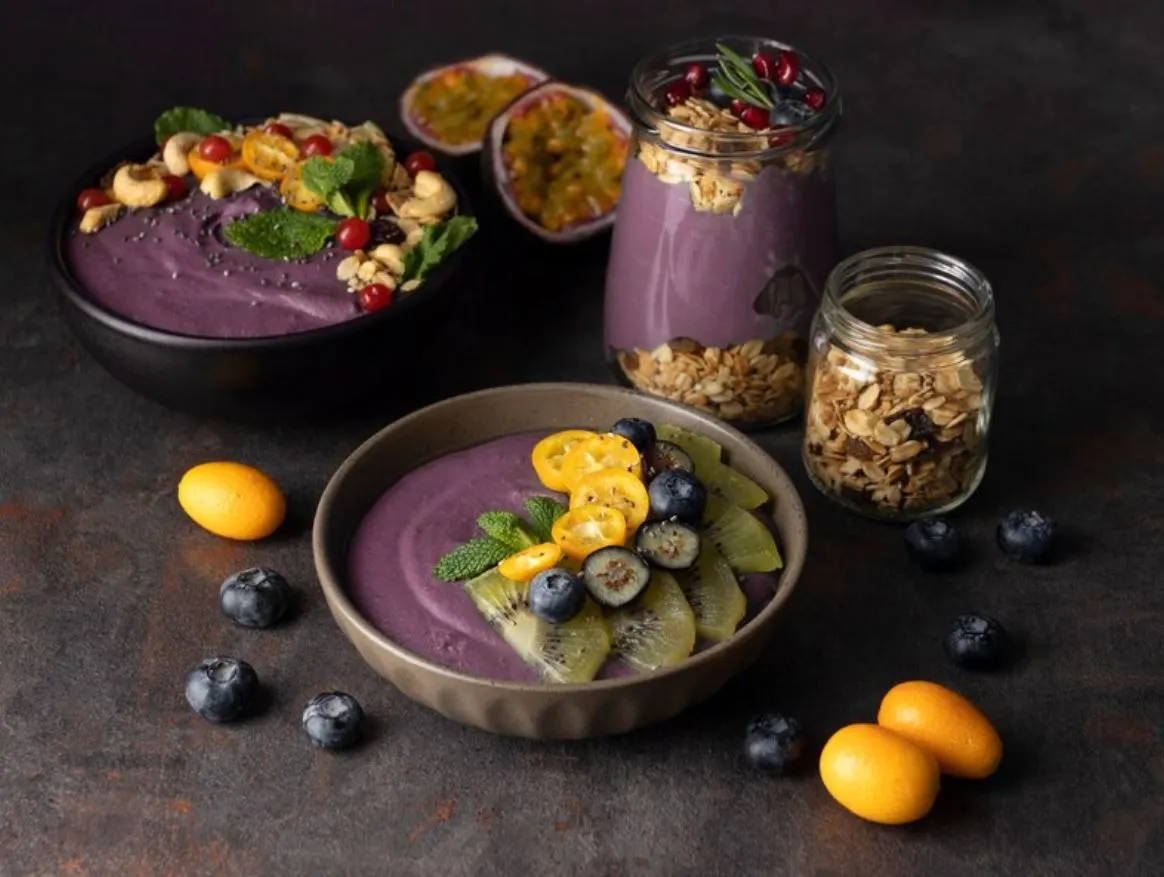For many people, the evening hours can be the trickiest when it comes to maintaining a healthy diet, especially if they’re trying to lose weight. After a long day, hunger pangs or cravings can sneak up, often leading to poor dietary choices that sabotage weight-loss goals. However, with a mindful approach and smart choices, it’s possible to satisfy nighttime hunger without compromising your weight loss plan.
Understanding Nighttime Eating and Weight Loss
Nighttime eating has long been considered a roadblock to weight loss. Some believe that eating late in the evening inevitably leads to weight gain, but research shows that it’s not the timing of the meal that matters as much as the types of food you consume and your total caloric intake throughout the day. By focusing on nutrient-dense, low-calorie foods, you can make nighttime eating part of a balanced approach to losing weight.
The Science Behind Eating at Night
Our bodies have an internal clock, or circadian rhythm, that affects everything from sleep patterns to metabolism. While metabolism does slow slightly at night, it doesn’t come to a halt. What matters most is choosing foods that are easy to digest, low in calories, and satisfying enough to prevent any late-night binges. Eating the right types of food in moderate portions can help you feel full, maintain energy levels, and even support muscle repair and relaxation during sleep.
Debunking Common Myths Around Nighttime Eating
There are several common misconceptions surrounding nighttime eating, especially when it comes to weight loss. Here are a few of the most widely held myths—and the facts behind them.
Myth 1: Eating After 8 PM Leads to Weight Gain
This myth likely stems from the idea that your body stores more calories as fat at night due to slower metabolism. However, research shows that it’s not the time of day but rather the total calories consumed that matters. Late-night snacking is only problematic if it causes you to exceed your calorie target for the day.
Myth 2: Carbs Should Be Avoided at Night
Carbohydrates often get a bad reputation in the weight loss world, especially at night. However, complex carbohydrates can actually support relaxation by promoting serotonin production, which helps regulate sleep. A small serving of complex carbs, such as whole grains, can be a healthy part of an evening snack.
Myth 3: Nighttime Snacks Lead to Overeating
While it’s true that snacking mindlessly can lead to overeating, intentional nighttime snacks that focus on protein, fiber, and healthy fats can be part of a balanced diet. Planning and portioning your snacks prevents mindless eating and keeps you from going overboard.
What to Look for in a Healthy Nighttime Snack
The key to nighttime snacking that supports weight loss is to choose foods that provide a balance of nutrients. Here are a few qualities to look for in your evening snack:
- High in Protein: Protein supports muscle repair and provides satiety, making it a great choice for an evening snack. Protein-rich foods like Greek yogurt or cottage cheese are ideal as they keep you full longer.
- Rich in Fiber: Fiber aids in digestion and promotes a feeling of fullness. Foods like vegetables, whole grains, and fruits are fiber-rich and low in calories.
- Low in Sugar: High-sugar foods can spike your blood sugar and disrupt your sleep cycle. Opt for low-sugar snacks to keep blood sugar stable.
- Contains Healthy Fats: Healthy fats, such as those found in nuts, avocados, and seeds, help control hunger while providing long-lasting energy.
Best Foods to Eat at Night for Weight Loss
The following are some of the best foods to enjoy at night that support weight loss, promote fullness, and even aid in relaxation and quality sleep.
1. Greek Yogurt with Berries and Honey
Greek yogurt is a high-protein snack that contains probiotics for better digestion. Adding berries provides antioxidants and fiber, and a small drizzle of honey adds natural sweetness without excess sugar.
Why It Works: Protein promotes satiety, while honey and berries add natural sugars and fiber.
Serving Suggestion: ½ cup of plain Greek yogurt, a handful of berries, and a teaspoon of honey.
2. Cottage Cheese with Almonds and Chia Seeds
Cottage cheese is rich in casein protein, which digests slowly, helping to keep you full. Almonds add healthy fats, and chia seeds provide fiber and omega-3 fatty acids.
Why It Works: Casein protein supports muscle repair and keeps you full; healthy fats add long-lasting satiety.
Serving Suggestion: ½ cup of cottage cheese with a sprinkle of chia seeds and a few almonds.
3. Turkey Roll-Ups with Avocado
Turkey is high in tryptophan, an amino acid that helps produce serotonin and supports sleep. Adding avocado provides healthy fats, keeping you full.
Why It Works: Tryptophan aids relaxation, while avocado’s healthy fats offer satiety.
Serving Suggestion: 3-4 slices of turkey with a quarter of an avocado.
4. Warm Milk with Cinnamon
Warm milk is a comforting, sleep-promoting option due to its natural tryptophan content. Adding cinnamon enhances flavor and helps regulate blood sugar.
Why It Works: Tryptophan supports sleep, and cinnamon has blood sugar-stabilizing properties.
Serving Suggestion: 1 cup of warm milk with a sprinkle of cinnamon.
5. Hummus with Raw Veggies
Hummus offers plant-based protein and fiber, making it a filling snack. Pairing it with veggies like bell peppers or cucumbers adds hydration and nutrients with minimal calories.
Why It Works: Protein and fiber in hummus provide satiety, and raw veggies add bulk.
Serving Suggestion: 2 tablespoons of hummus with raw vegetables.
6. Oatmeal with Walnuts and Berries
Oatmeal is a slow-digesting carbohydrate, perfect for nighttime. Walnuts provide healthy fats, and berries add antioxidants and natural sweetness.
Why It Works: Fiber in oatmeal keeps you full, and walnuts add omega-3 fats.
Serving Suggestion: ½ cup of cooked oatmeal with berries and a few walnut pieces.
7. Small Smoothie with Spinach, Almond Milk, and a Banana
This smoothie is a nutrient powerhouse: spinach offers magnesium, almond milk is low-calorie, and banana provides natural sugar and potassium.
Why It Works: Magnesium in spinach supports relaxation, and banana’s tryptophan aids sleep.
Serving Suggestion: 1 cup of almond milk, a handful of spinach, and half a banana.
8. Apple Slices with Peanut Butter
Apples provide fiber, keeping you full, while peanut butter adds healthy fats and protein, making this a satisfying, nutrient-dense snack.
Why It Works: Fiber in apples promotes fullness, and peanut butter adds protein.
Serving Suggestion: 1 small apple with 1 tablespoon of peanut butter.
9. Chia Pudding with Almond Milk and Vanilla Extract
Chia seeds create a filling pudding thanks to their fiber and healthy fat content. Adding a dash of vanilla makes it taste like a treat without added sugar.
Why It Works: Fiber and fats in chia seeds keep you full, while vanilla adds flavor without calories.
Serving Suggestion: 1 tablespoon chia seeds, ½ cup almond milk, and vanilla extract.
10. Hard-Boiled Eggs with Spinach
Eggs are protein-rich and low in calories, while spinach is packed with magnesium, which supports muscle relaxation.
Why It Works: Protein and fat from eggs keep you full, and spinach’s magnesium aids relaxation.
Serving Suggestion: 2 hard-boiled eggs and a handful of fresh spinach.
11. Avocado Toast on Whole Grain Bread
Whole grain bread provides complex carbs, and avocado offers healthy fats that satisfy hunger and help stabilize blood sugar.
Why It Works: Whole grains digest slowly, and avocado’s fats provide satiety.
Serving Suggestion: 1 slice of whole grain toast with ¼ avocado.
12. Pumpkin Seeds
Pumpkin seeds are a great source of magnesium, zinc, and healthy fats, supporting relaxation and stable blood sugar levels.
Why It Works: Magnesium and zinc in pumpkin seeds promote relaxation, and fats keep you full.
Serving Suggestion: 1 small handful of pumpkin seeds.
13. Cottage Cheese with Pineapple
Cottage cheese is loaded with protein, and pineapple provides natural sweetness, fiber, and bromelain, an enzyme aiding digestion.
Why It Works: Protein from cottage cheese keeps you full, while pineapple’s fiber aids digestion.
Serving Suggestion: ½ cup cottage cheese with a few pieces of pineapple.
14. Dark Chocolate with Almonds
Dark chocolate, in moderation, is rich in antioxidants and contains magnesium, which can aid relaxation. Pairing with almonds provides protein and healthy fats.
Why It Works: Magnesium and antioxidants in chocolate support relaxation, and almonds keep you full.
Serving Suggestion: 1-2 small squares of dark chocolate and a few almonds.
15. Protein-Rich Lentil Soup
Lentils are an excellent source of plant-based protein and fiber, keeping you full and satisfied through the night.
Why It Works: Protein and fiber in lentils promote satiety, and warmth aids relaxation.
Serving Suggestion: 1 small bowl of lentil soup, ideally low-sodium.
Foods to Avoid at Night for Weight Loss
While some foods support weight loss and sleep, others can disrupt both. Avoid the following foods if you’re trying to lose weight or improve sleep quality:
1. Ice Cream
High in sugar and fat, ice cream can spike blood sugar, disrupting sleep and slowing metabolism. Late-night sugar intake is stored as fat rather than burned off.
2. Pizza
Pizza is high in refined carbs, fats, and salt, which can cause bloating and discomfort while sleeping. The high fat content also slows digestion, increasing calorie storage.
3. Pasta
Pasta is a refined carbohydrate, causing rapid spikes in blood sugar followed by crashes. At night, the body’s lower energy needs mean excess carbs are more likely to be stored as fat.
4. Chips and Crackers
These snacks are calorie-dense, high in refined carbs, and low in nutrients. Their high salt content can cause water retention, leading to bloating and making you feel sluggish the next day.
5. Chocolate
Chocolate contains sugar and sometimes caffeine, which can interfere with sleep quality. The added calories and sugar are more likely to be stored as fat overnight.
6. Sugary Cereals
Sugary cereals contain refined grains and added sugars, causing blood sugar spikes and promoting fat storage. They also don’t keep you full, leading to late-night cravings.
7. Bread and Butter
White bread is a refined carb that spikes blood sugar without adding substantial nutrients, and butter adds unnecessary saturated fat. This combination can lead to weight gain.
8. French Fries
Fries are deep-fried in oils high in trans fats and loaded with salt, which slows digestion, causes bloating, and encourages fat storage. They are calorie-dense without offering lasting satiety.
9. Burgers
Burgers are high in saturated fats and refined carbs, taking a long time to digest. The calorie load, especially from the bun, meat, and condiments, can disrupt weight-loss progress.
10. Fruit Juice
Although natural, fruit juices are concentrated sources of sugar without fiber, leading to blood sugar spikes. Consuming these sugars before bed can disrupt sleep and increase fat storage.
11. Alcohol
Alcoholic drinks are high in empty calories, and they interfere with your sleep cycle. Alcohol can lower metabolism and promote fat storage, making weight loss more difficult.
12. Doughnuts and Pastries
Pastries contain refined sugars and fats, often from hydrogenated oils. These empty calories can disrupt blood sugar levels and promote fat storage, especially at night.
13. Chinese Takeout
Many Chinese dishes are high in refined carbs, fats, and sodium, causing bloating and water retention. The calorie load is excessive for nighttime and can hinder weight loss.
14. Full-Fat Cheese
While cheese can be filling, full-fat versions contain high amounts of saturated fat and calories, increasing the chance of gaining weight if consumed late.
15. Sugary Sodas and Energy Drinks
Sugary sodas and energy drinks provide a caffeine and sugar rush, which can lead to late-night wakefulness and disrupt metabolism. Excess sugars are more likely to be stored as fat.
Nighttime Eating Strategies for Weight Loss Success
1. Plan Your Evening Snack Wisely
Choose snacks that are high in protein and fiber, as they help you feel full longer. Opt for snacks like Greek yogurt, cottage cheese, or a handful of nuts. These provide essential nutrients while preventing late-night cravings.
2. Stick to Portion Control
If you crave a particular food, have a small portion rather than a large one. Measuring out portions or pre-packing snacks can help avoid overeating and reduce late-night calorie intake.
3. Eat Earlier in the Evening
Try to have your dinner at least three hours before bed. This allows your body ample time to digest, helping prevent late-night hunger and improving sleep quality.
4. Choose Complex Carbohydrates Over Simple Carbs
Complex carbs like oatmeal or quinoa digest slowly, preventing sudden blood sugar spikes and crashes that can lead to hunger. This helps keep you satisfied without disrupting your metabolism.
5. Stay Hydrated
Sometimes, hunger is mistaken for thirst. Drinking water or herbal tea before reaching for a snack can help you determine if you’re truly hungry. Staying hydrated can curb cravings and prevent overeating.
6. Opt for Low-Calorie, High-Volume Foods
Foods like air-popped popcorn, raw veggies, or a small salad can provide volume and satisfaction without excessive calories. These choices help you feel full while keeping your calorie intake low.
7. Focus on Protein-Rich Snacks
Protein takes longer to digest and can help curb hunger pangs through the night. Try a small portion of lean protein, like a hard-boiled egg or some cottage cheese, to keep you full.
8. Avoid Sugary and Caffeinated Beverages
Late-night sugars and caffeine can lead to blood sugar spikes and poor sleep. Opt for water, herbal tea, or a warm glass of milk if you need a drink in the evening.
9. Prioritize Foods with Sleep-Supporting Nutrients
Foods rich in magnesium, like nuts and leafy greens, and those with tryptophan, like turkey and bananas, support relaxation and help improve sleep quality, benefiting weight management.
10. Create a Calming Bedtime Routine
Sometimes late-night snacking is due to boredom or stress. Establish a calming routine with activities like reading, light stretching, or meditation to reduce stress-induced snacking.
11. Listen to Your Hunger Cues
Recognize if you’re truly hungry or just eating out of habit or boredom. Mindful eating—paying attention to how you feel—can help you make better decisions about what and when to eat.
12. Incorporate a Small Evening Meal
If you know you tend to get hungry before bed, plan a small, balanced evening meal that includes protein, fiber, and healthy fats. This can reduce the urge to snack later on.
13. Limit Eating to a Consistent Schedule
Sticking to a regular eating schedule helps regulate hunger and fullness cues. Avoiding late-night meals by setting a cut-off time can support weight loss by helping your body burn calories efficiently.
14. Avoid Multi-Tasking While Eating
Eating mindfully, without distractions, can help you enjoy food more and feel satisfied sooner. Multi-tasking, like watching TV or using your phone, often leads to overeating.
15. Have a Backup Plan for Intense Cravings
If you’re struggling with intense cravings, have a low-calorie backup, like sliced cucumber or a small apple, on hand. This can satisfy the craving without derailing your progress.
Final Thoughts: Harnessing Nighttime Eating for Weight Loss
Nighttime eating doesn’t have to be a barrier to weight loss. By selecting nutritious, low-calorie foods rich in protein, fiber, and healthy fats, you can enjoy satisfying snacks that won’t hinder your goals. Foods like Greek yogurt, cottage cheese, nuts, and certain fruits can make for balanced snacks that help keep hunger at bay and promote better sleep.




